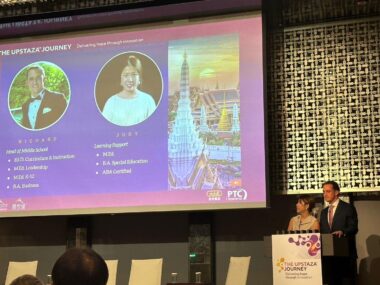Celebrating the hope from AADC deficiency gene therapy
Recognizing who made Upstaza possible as more nations move to approve it
Written by |

In December 2018, my wife, Judy, and I embarked on a journey from Singapore to Taiwan, driven by nothing more than a hunch that our daughter, Rylae-Ann, might have a rare disease. At that point, she was only a baby, showing signs of struggle that no one could explain. It was a dark period for our family, one where we faced uncertainty every single day. We had no answers and no clear path forward, but we knew we had to act.
On Christmas Day, we learned our hunch was right when Paul Wuh-Liang Hwu, MD, PhD, diagnosed her with aromatic l-amino acid decarboxylase (AADC) deficiency. Despite the end of our diagnostic odyssey and finally learning what was causing the severe symptoms in our daughter, we were left with even more questions.
About a year later, in November 2019, Rylae-Ann participated in a clinical trial in Taiwan for a revolutionary gene therapy targeting AADC deficiency. We’d taken a leap of faith, one that carried both hope and fear. We had no guarantees that the treatment, eladocagene exuparvovec (now known as Upstaza), would work, but we knew it was her only shot at survival.
Now, nearly five years later, Rylae-Ann is a thriving first grader. She loves learning, horseback riding, and swimming, all activities that once seemed unimaginable. Looking back, our journey was filled with perseverance as we advocated for the approval of the treatment that had saved her life. Upstaza has since been approved in the European Union, the U.K., and Israel, giving other families the same hope we held onto.
Just recently, we helped celebrate Upstaza’s journey in Taiwan, where it seems to be moving forward to approval and coverage by the nation’s National Health Insurance Administration. For us, this change is deeply personal. Taiwan was the place where our daughter was reborn, where her life was given back to her.
And now, families across Taiwan have the same opportunity. Possibly because of its incredible newborn screening program, Taiwan has one of the highest rates of identified patients. Between 2000 and 2023, 77 people were diagnosed there. For the children who survived, there’s now a tangible hope: an opportunity to be treated.
The people behind Upstaza

Judy and Richard Poulin share a parent perspective during a September event in Taiwan. (Courtesy of Richard E. Poulin III)
To commemorate this milestone, PTC Therapeutics, the company behind Upstaza, invited Judy and me to join those who had helped bring this treatment to life. It was a profound honor to stand alongside the doctors, researchers, and advocates who’d made this possible. As we shared our journey, we reflected on how far we’d come — from the darkest days of uncertainty to the bright future we never could’ve predicted.
Attending this event was not just a celebration of a medical breakthrough; it was a celebration of life, resilience, and the power of hope. Our daughter’s journey has been one of incredible strength, and we’re forever grateful to those who helped make it possible for her and countless others.
As Taiwan moves toward Upstaza approval, we feel blessed to have witnessed this chapter of medical history unfold.
The event included the following notable professionals:
- Shin-Ichi Muramatsu: Pioneered the research on administering gene therapy in the brain to treat Parkinson’s disease, laying the groundwork for similar approaches in other neurological conditions.
- Paul Wuh-Liang Hwu: Expanded on Muramatsu’s research, leading the application of gene therapy to treat AADC deficiency, transforming potential into practice.
- Barry J. Byrne: Directed research at the Powell Gene Therapy Center, University of Florida, focusing on the development and use of recombinant AAV (adeno-associated virus) vector for gene therapy, a key component in delivering the treatment for AADC deficiency.
- Sheng-Che Chou: Advanced gene therapy through research on robotic-assisted technology, increasing precision and lowering the age at which patients can safely undergo treatment.
- Yin-Hsiu Chien: Spearheaded Taiwan’s newborn screening program to identify AADC deficiency in infants and develop a comprehensive post-gene therapy care program to support children after treatment.
- Tung-Ming Chang: Discovered the first cases of AADC deficiency in Taiwan, collaborating with Keith Hyland, PhD, who originally identified the disorder, contributing significantly to early diagnosis efforts.
- Agathe Roubertie and Takanori Yamagata: Both experts in the global diagnosis, treatment, and advancement of gene therapy for AADC deficiency, contributing to the international effort to improve patient outcomes.
It was extra special to have Rylae-Ann meet and thank each doctor in person. I believe all of them were honored to have her appreciation. She even ran up to the CEO of PTC Therapeutics, Matthew Klein, MD, to give him a big bear hug.
For parents facing similar struggles, know that there’s always a light ahead, even in the darkest moments. We’re living proof that hope, combined with determination and a dedicated community’s support, can lead to unimaginable outcomes. Today, Rylae-Ann is thriving — and we continue to believe in the power of possibility.
Note: AADC News is strictly a news and information website about the disease. It does not provide medical advice, diagnosis, or treatment. This content is not intended to be a substitute for professional medical advice, diagnosis, or treatment. Always seek the advice of your physician or other qualified health provider with any questions you may have regarding a medical condition. Never disregard professional medical advice or delay in seeking it because of something you have read on this website. The opinions expressed in this column are not those of AADC News or its parent company, Bionews, and are intended to spark discussion about issues pertaining to aromatic l-amino acid decarboxylase deficiency.






Leave a comment
Fill in the required fields to post. Your email address will not be published.